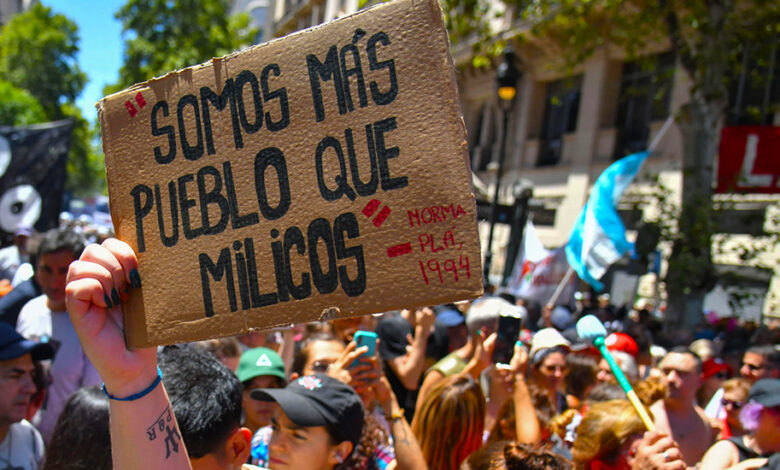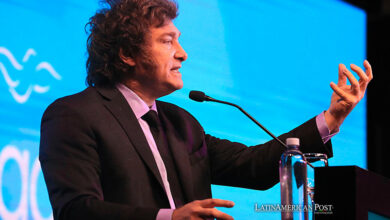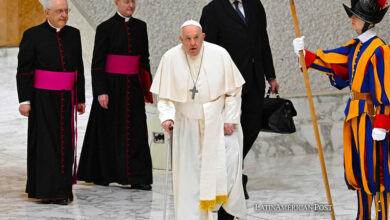Argentina’s Milei Faces General Strike Over Economic Reforms

A month into his presidency, Argentina’s right-wing leader Javier Milei confronts a national strike protesting his aggressive union-targeting decree and sweeping economic reform proposals, reflecting deep societal divides.
Challenges to Milei’s Presidency
Javier Milei, Argentina’s newly elected right-wing president, faces significant backlash just over a month into his tenure. A national strike, organized by the country’s largest labor union, CGT, and supported by various other unions, is challenging Milei’s radical approach to economic and labor reforms. This mobilization, involving protests in Buenos Aires and other cities, is backed by social organizations and political opponents, including the historically influential Peronist Party.
Milei, a fervent critic of the political establishment who gained prominence through his televised outbursts against the status quo, won last year’s presidential race by a wide margin. His libertarian ideology includes a commitment to drastically reduce state expenditure to address a substantial fiscal deficit, which he blames for the country’s soaring inflation rate, peaking at 211% in 2023.
On December 20, Milei issued a controversial decree proposing to revoke or modify over 300 existing laws to curb the power of unions and dismantle Argentina’s traditionally heavy state intervention in the economy. Additionally, he introduced an omnibus bill to Congress, seeking comprehensive reforms across political, social, fiscal, legal, administrative, and security sectors.
Historical Significance of the General Strike
This general strike marks the first in Argentina in over four years. It is notably the quickest to be organized against a president since the return of democracy in 1983. This rapid mobilization against Milei contrasts starkly with his predecessor, center-left Alberto Fernández, who did not face any general strikes during his tenure.
The strike has elicited strong responses from the Milei administration. Security Minister Patricia Bullrich labeled the organizers as “mafiosos,” accusing them of obstructing the change mandated by the November election. The administration’s spokesperson, Manuel Adorni, echoed this sentiment, asserting that dialogue is impossible with those who allegedly display anti-democratic tendencies by attempting to halt the country.
Milei, who secured a 56% victory in the runoff vote, warned in his inaugural address that the nation’s situation would worsen before improving. Despite the escalating inflation and recent mass layoffs at state-owned firms, two separate polls indicate that he still retains the support of over half of the populace.
Controversial Decree’s Impact and Worker Rights Concerns
Milei’s decree has been particularly contentious, limiting the right to strike for essential workers in critical services such as healthcare, education, and transport. It introduces new compensation mechanisms facilitating employee termination. It allows workers to pay private healthcare providers directly, bypassing unions and significantly reducing their revenue streams.
The national strike’s impact was evident in Buenos Aires and other areas, with limited operations in banks, gas stations, public administration, healthcare, and trash collection. The state-owned airline Aerolineas Argentinas canceled 267 flights, rescheduling others and affecting over 17,000 passengers.
Milei’s proposed omnibus bill, currently under negotiation in the Lower House, is posited to stabilize the economy, curb inflation, and alleviate poverty affecting nearly 40% of Argentines. A vote on the bill is expected imminently.
This widespread strike against Milei’s policies signals a deep societal division in Argentina, reflecting the complexities of implementing far-reaching economic reforms in a country with a strong tradition of unionism and state intervention. The strike challenges Milei’s policy directions and underscores the broader political and economic tensions within Argentina.
Omnibus Bill and the Road Ahead
Milei’s approach, while aiming to bring economic stability and growth, has sparked fears among many Argentines about the potential social costs of such reforms. Some see his policies, particularly those targeting unions and labor rights, as an attack on the working class and a departure from Argentina’s traditional labor protections.
The situation unfolding in Argentina indicates the challenges Latin American countries face as they navigate the delicate balance between economic reform and social stability. The response to Milei’s administration and its policies may serve as a barometer for similar regional reform efforts.
Also read: Former Guatemalan President Faces U.S. Entry Ban Over Corruption Claims
The general strike in Argentina represents a critical moment in the early days of Javier Milei’s presidency, highlighting his resistance to implementing his vision for the country’s economic future. As Argentina grapples with high inflation and financial uncertainties, the outcome of this conflict will have significant implications for the nation’s path forward, both economically and politically. The Milei administration’s ability to navigate these challenges and negotiate with various stakeholders will be crucial in determining the success of its reform agenda and Argentina’s future stability.




